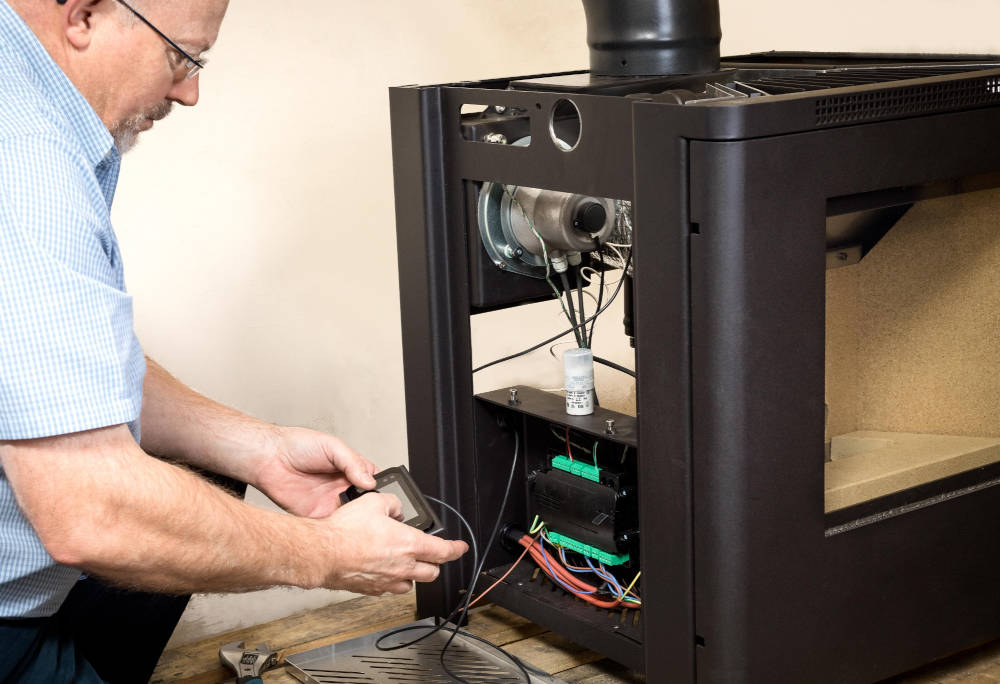PRESS RELEASE: Invention helps to reduce air pollution from wood burning stoves
An engineer from Cardiff has invented a new type of domestic wood burning stove to help combat climate change and also help the government meet its new clean air strategy.
Marc Howell, who studied engineering at Cardiff University followed by years working as an engineer in the renewable energy sector, spent seven years working in his garage near Cowbridge, Vale of Glamorgan to perfect new patented technology that provides a real wood burning stove experience but with very low levels of emissions.
There is much debate and concern about the health impacts of air pollutants from particulates and nitrous oxides. The levels of these pollutants are highest in urban centres and are produced from burning of fuels for heat and vehicles as well industry, air transport and agriculture. Caught up in the debate have been the emissions from domestic wood burning fires and stoves.
Although burning wood has previously been viewed as environmentally beneficial because it reduces carbon emissions and offsets fossil fuel use, it is also the case that burning wood inefficiently does emit particles and Nitrous Oxide emissions.
The Government’s Clean Air Strategy promises to set a ‘bold new goal’ to reduce the current level of particulates across the country by 2030. The strategy looks to make our air healthier to breath, better protect nature and boost the economy and it will do this by introducing a range of actions to reduce emissions/pollution.
One of the actions is the ban of burning wet wood logs and coal as burning solid fuels inefficiently certainly does produce harmful emissions and when compared to a vehicle it can be shown that a single wood burning stove has emissions greater than a large diesel vehicle.
But is domestic wood burning really causing our cities to break EU and World Health Organisation air quality limits? Is wood smoke as harmful as diesel exhausts? Does smoke from a chimney enter our lungs like fumes from vehicles at street level? There is not enough research to show exactly which sources are most responsible for harm to health.
Marc says ‘It seems unlikely that wood stoves are contributing significantly to air quality, for example, Cardiff’s air quality can be just as poor in periods during the summer when we can assume its population is not warming themselves by the fire. But this doesn’t mean its ok; all sources of emissions need to be reduced.’
The UK has major challenges in both improving air quality and reducing our dependence on gas and fossil fuels to play our part in reducing the impacts of global climate change.
There is no imminent ban on log stoves although the standards on their emissions will become so much more stringent that only a few of the products on the market can currently achieve the limits set.
This was the driving force for Marc as not only could he see the benefits of sustainably heating a home with wood but he could also see the potential conflict of its air quality impact on health. ‘Burning wood just had to be made more efficient and less polluting’ said Marc ‘through our experiences of reducing emissions from larger scale wood pellet systems we knew there was a way to create the real wood fire experience that is so desirable in the UK but yet do it cleanly and not at the cost of harming health’
It was wood pellets that are manufactured from timber industry residues and are produced into dry, regular-shaped pellets containing less than 1% ash and less than 10% water that were the key to the challenge. An electronically operated device, that automatically lights the wood pellets and controls the feeding of the fuel with controlled levels of pre-heated air, allows greater control of the combustion process and was found to be the way to significantly reduce the emissions and increase the overall efficiency of using the energy from the wood fuel. The air used for burning the wood pellet fuel is pre-heated to a high temperature by the exhaust gases using a “balanced flue” as is commonplace with domestic gas boilers.
‘but how to get this high-efficiency combustion process into a stove small enough to fit into a UK fireplace and be able to reproduce the real wood fire experience that we British have come to love – that was the challenge’ Marc stated
‘We started in my garage with the help of a colleague. I was thinking we could produce a solution within a year, but looking back it has not been so straight forward and it has taken seven years to achieve a commercial solution and gain the safety accreditations with CE marking and also a UK patent on the invention.”
Could this small, Welsh tech start-up company offer a solution to support the UK’s ‘Clean Air Strategy’ but also fit with the plans to combat climate change ?
Marc certainly believes so and is investing in bringing his ‘Made in Wales’ technology to market.
ENDS
Tel: 0330 111 4747
E-mail:info@islandpelletstoves.co.uk
Revolutionise Home Heating with Innovative Solutions: Reducing Air Pollution from Wood-Burning Stoves
In the pursuit of eco-friendly heating, our groundbreaking invention addresses the environmental impact of traditional wood-burning stoves, including multi-fuel stoves, log burners, and wood burners. Discover the transformative benefits of our invention and its positive implications for stove installation and the broader home heating landscape.
Cleaner Air, Healthier Homes:
Our invention significantly reduces air pollution associated with wood-burning stoves. By optimising combustion efficiency, it minimises harmful emissions, fostering cleaner air quality inside and outside your home. Breathe easy and promote a healthier living environment for your loved ones.
Multi-Fuel Stove Adaptability:
Designed with versatility in mind, our invention seamlessly integrates with multi-fuel stoves. Whether you use wood, coal, or other solid fuels, our technology ensures efficient combustion, mitigating pollution while maximising the benefits of your multi-fuel stove.
Enhanced Log Burner Performance:
Elevate the performance of log burners with our innovation. Experience cleaner burning and increased energy efficiency, translating into reduced emissions and lower environmental impact. Our solution optimises the use of wood logs, making your log burner both eco-conscious and effective.
Efficient Wood Burner Operation:
Transform your wood burner into an environmentally responsible heating source. Our invention enhances combustion efficiency, minimising particulate matter and other pollutants released during the burning process. Enjoy the warmth of your wood burner with a clear conscience.
Seamless Stove Installation Integration:
Our invention is designed for easy integration during stove installation. Whether retrofitting existing stoves or installing new units, our technology enhances the overall efficiency of the heating system, contributing to a cleaner and greener energy source for your home.
Sustainable Heating Practices:
Embrace sustainable heating practices with our innovative solution. By reducing air pollution from wood-burning stoves, our invention aligns with environmental stewardship, promoting responsible energy consumption and a more sustainable approach to home heating.
Invest in the future of eco-friendly heating with our groundbreaking invention. Experience the benefits of reduced air pollution, optimised multi-fuel stove performance, and cleaner log burner and wood burner operation. Make a positive impact on the environment while enjoying the warmth of your home. Contact Island Pellet Stoves to explore our innovative solutions today.

